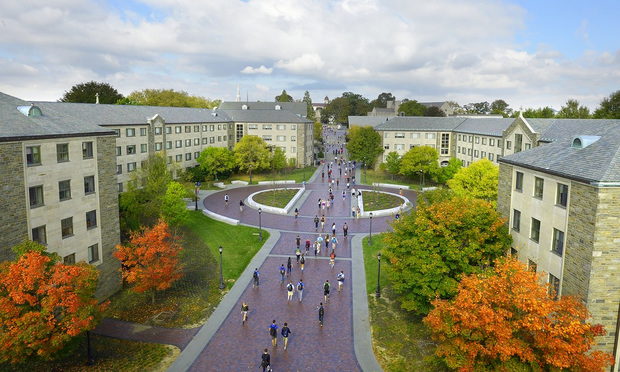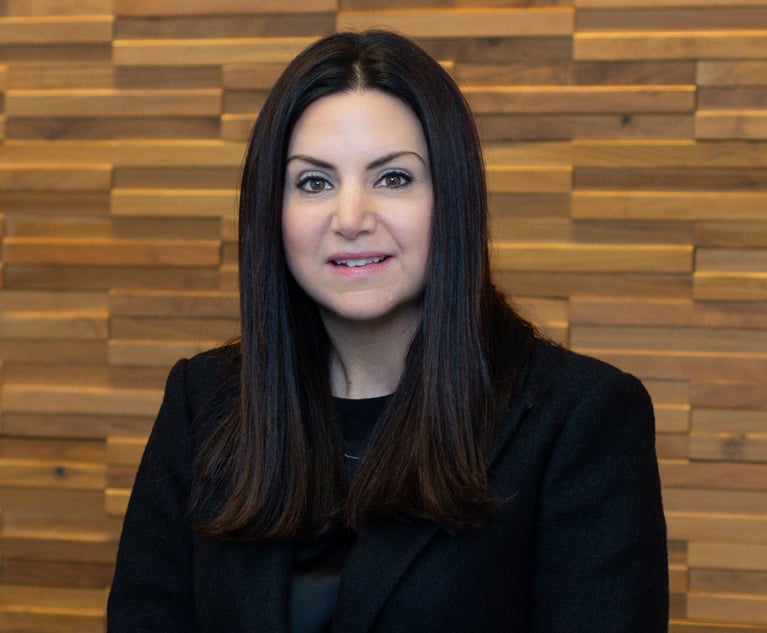Former Villanova Wide Receiver's Wage Lawsuit Against NCAA Sacked
The judge said in his opinion that Livers did not have standing to pursue litigation against schools he did not attend and that he made no actionable FLSA claim.
May 18, 2018 at 02:44 PM
4 minute read

A federal judge has dismissed a lawsuit filed by former Villanova University football team wide receiver Lawrence “Poppy” Livers against the NCAA and dozens of colleges claiming he should have been paid for his time as a scholarship athlete—but the case may not be finished yet.
U.S. District Judge Michael Baylson of the Eastern District of Pennsylvania dismissed Livers' Fair Labor Standards Act claims against multiple universities and the National Collegiate Athletic Association for failure to state a claim against the schools he did not attend, but granted him leave to re-file against Villanova and the NCAA.
First, Baylson said in his opinion that Livers did not have standing to pursue litigation against schools he did not attend. Second, Baylson said Livers made no actionable FLSA claim.
Regarding the FLSA claim, the argument centered on the two-year statute of limitations. Baylson said the statute is extended to three years if the violation was willful. Livers' last season with Villanova football ended on Dec. 13, 2014, and his complaint was filed on Sept. 26, 2017.
But Baylson said Livers did not show willfulness on the part of the defendants.
“Plaintiff has not specifically alleged facts showing reckless disregard on behalf of either the NCAA or Villanova, with respect to their non-payment of plaintiff,” Baylson said. “Plaintiff does not allege any facts regarding any school or the NCAA having knowledge of any potential duty to compensate plaintiff, or even disregarding such a duty. Unless plaintiff can allege facts that if true would be sufficient to establish that the defendants acted intentionally or with reckless disregard to their obligations under the FLSA, then his claim must be dismissed as time barred.”
Additionally, Baylson said that even if Livers could prove willfulness, college athletes are not considered employees under the FLSA, as noted in the U.S. Department of Labor's Field Operations Handbook.
“The complaint does not make any allegations that would overcome the impact of the
relatively straightforward FOH guidance to schools that their student athletes are not FLSA
covered employees,” Baylson said. “Specifically, the impact of that guidance would likely require the court to rule that defendants acted reasonably in making the judgment that they need not compensate student athletes pursuant to the FLSA, and therefore that defendants did not willfully violate the FLSA.”
Still, Baylson said Livers should be afforded “the opportunity to amend his complaint to allege additional facts, if he can, addressing willfulness in order to attempt to overcome the time bar to his claim.”
“In order to be successful in this regard, plaintiff will have to plead facts plausibly establishing
willfulness, and must address the FOH guidelines and allege either facts or cite law to support the conclusion that defendants willfully violated the FLSA despite reliance on the FOH
guidance,” Baylson said.
Paul L. McDonald of PL McDonald Law in Philadelphia represents Livers and did not respond to a request for comment. Donald Prophete of Constangy, Brooks, Smith & Prophete in Kansas City, Missouri, represents the NCAA and the universities and also did not respond to a request for comment.
In a statement sent Friday, NCAA's chief legal officer Donald Remy said, “the dismissal of Livers v. NCAA confirms previous court rulings that student-athletes are not university employees. These types of lawsuits ignore the fact that college athletics create a pathway to education and opportunity for nearly half a million student-athletes each year. The NCAA remains confident that courts will continue to uphold the precedent set by prior decisions that student-athletes are not employees.”
This content has been archived. It is available through our partners, LexisNexis® and Bloomberg Law.
To view this content, please continue to their sites.
Not a Lexis Subscriber?
Subscribe Now
Not a Bloomberg Law Subscriber?
Subscribe Now
NOT FOR REPRINT
© 2025 ALM Global, LLC, All Rights Reserved. Request academic re-use from www.copyright.com. All other uses, submit a request to [email protected]. For more information visit Asset & Logo Licensing.
You Might Like
View All


Pa. Superior Court Rules Pizza Chain Liable for Franchisee Driver's Crash
4 minute read
Trending Stories
Who Got The Work
J. Brugh Lower of Gibbons has entered an appearance for industrial equipment supplier Devco Corporation in a pending trademark infringement lawsuit. The suit, accusing the defendant of selling knock-off Graco products, was filed Dec. 18 in New Jersey District Court by Rivkin Radler on behalf of Graco Inc. and Graco Minnesota. The case, assigned to U.S. District Judge Zahid N. Quraishi, is 3:24-cv-11294, Graco Inc. et al v. Devco Corporation.
Who Got The Work
Rebecca Maller-Stein and Kent A. Yalowitz of Arnold & Porter Kaye Scholer have entered their appearances for Hanaco Venture Capital and its executives, Lior Prosor and David Frankel, in a pending securities lawsuit. The action, filed on Dec. 24 in New York Southern District Court by Zell, Aron & Co. on behalf of Goldeneye Advisors, accuses the defendants of negligently and fraudulently managing the plaintiff's $1 million investment. The case, assigned to U.S. District Judge Vernon S. Broderick, is 1:24-cv-09918, Goldeneye Advisors, LLC v. Hanaco Venture Capital, Ltd. et al.
Who Got The Work
Attorneys from A&O Shearman has stepped in as defense counsel for Toronto-Dominion Bank and other defendants in a pending securities class action. The suit, filed Dec. 11 in New York Southern District Court by Bleichmar Fonti & Auld, accuses the defendants of concealing the bank's 'pervasive' deficiencies in regards to its compliance with the Bank Secrecy Act and the quality of its anti-money laundering controls. The case, assigned to U.S. District Judge Arun Subramanian, is 1:24-cv-09445, Gonzalez v. The Toronto-Dominion Bank et al.
Who Got The Work
Crown Castle International, a Pennsylvania company providing shared communications infrastructure, has turned to Luke D. Wolf of Gordon Rees Scully Mansukhani to fend off a pending breach-of-contract lawsuit. The court action, filed Nov. 25 in Michigan Eastern District Court by Hooper Hathaway PC on behalf of The Town Residences LLC, accuses Crown Castle of failing to transfer approximately $30,000 in utility payments from T-Mobile in breach of a roof-top lease and assignment agreement. The case, assigned to U.S. District Judge Susan K. Declercq, is 2:24-cv-13131, The Town Residences LLC v. T-Mobile US, Inc. et al.
Who Got The Work
Wilfred P. Coronato and Daniel M. Schwartz of McCarter & English have stepped in as defense counsel to Electrolux Home Products Inc. in a pending product liability lawsuit. The court action, filed Nov. 26 in New York Eastern District Court by Poulos Lopiccolo PC and Nagel Rice LLP on behalf of David Stern, alleges that the defendant's refrigerators’ drawers and shelving repeatedly break and fall apart within months after purchase. The case, assigned to U.S. District Judge Joan M. Azrack, is 2:24-cv-08204, Stern v. Electrolux Home Products, Inc.
Featured Firms
Law Offices of Gary Martin Hays & Associates, P.C.
(470) 294-1674
Law Offices of Mark E. Salomone
(857) 444-6468
Smith & Hassler
(713) 739-1250





